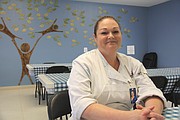Serving up hope
By KAYE THORNBRUGH
North Idaho College
On Jenny Pettit’s first day of culinary school, she looked around and realized that she was the oldest student in class.
“I thought, ‘What did you get yourself into?’” she said.
It was daunting, but she stuck with it. Pettit has always had a passion for cooking, not just for her own family, but for others. The 35-year-old mother of two regularly cooks for her neighbors and used to volunteer in the dining hall at St. Vincent de Paul, along with her daughters.
Pettit has health problems that limit the type of work she can do, and North Idaho College’s nine-month Culinary Arts program seemed like it would be a natural fit, for both her abilities and her passions. Now she runs Father Bill’s Kitchen, the St. Vincent de Paul dining hall where she previously volunteered, cooking for anywhere from 40 to 100 people a night.
“I love that I’m helping the community,” she said. “I’m not just feeding them—I’m feeding their ability to thrive.”
Currently, Pettit is helping to implement a new program at Father Bill’s Kitchen: “Dining with Dignity.” The concept is to make each meal more like restaurant service, and less like a bread line. Pettit says that simply being treated like ordinary people can give a boost of confidence to the community members she serves.
Much of Pettit’s practical experience in running a commercial kitchen came from a unique feature of NIC’s Culinary Arts program: Emery’s Restaurant and NICularts Deli, which are on-campus eateries staffed by Culinary Arts students. Beyond preparing meals, the students learn about customer service, purchasing and cost control, food and beverage pairing and more.
“They spend a lot of time, right from the beginning, running the restaurant,” said Hillary Ginepra, Culinary Arts instructor. “The restaurant gives tremendous experience.”
The culinary industry encompasses much more than just restaurants. It also includes establishments such as hospitals, senior living facilities and childcare facilities. Practically anywhere there is a need for food, there is also a need for people with culinary skills.
“The demand for skilled labor in our field is huge,” Ginepra said. In fact, recruiters from places like the Coeur d’Alene Resort and the Coeur d’Alene Casino regularly come to her, looking for potential new employees. “[Students] don’t have to go far. People are seeking them out. I don’t have enough students to meet the demand.”
In the NIC Culinary Arts program, Pettit didn’t just learn how to cook—she also learned why. Each new technique had a deeper meaning. For example, she learned the roles of different elements in a dish, such as why adding something acidic to a soup “brightens” the flavor. She didn’t simply practice her knife skills; she came to understand the myriad of ways in which cutting food affects texture, flavor and presentation. When she cooked an international dish, she learned the cultural context behind it. “You learn to take pride in your plate,” Pettit said.
For Pettit, cooking is a way of connecting with people. Her position as a chef in Father Bill’s Kitchen gives her the opportunity to communicate through the universal language of food. “No matter where you’re from, no matter your background, food is the one thing we have in common,” she said. “Whatever language you speak, you understand food. It brings people together. I can’t think of a happy memory in my life that I can’t relate to food. It’s the basis of life.”
For information on NIC’s Culinary Arts program, call (208) 769-3311 or visit www.nic.edu, click on “Instructional Programs” and then select “Culinary Arts” from the drop-down menu. To apply for this limited-enrollment program, visit www.nic.edu/apply.



